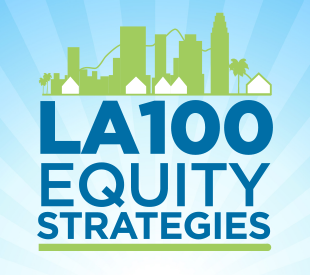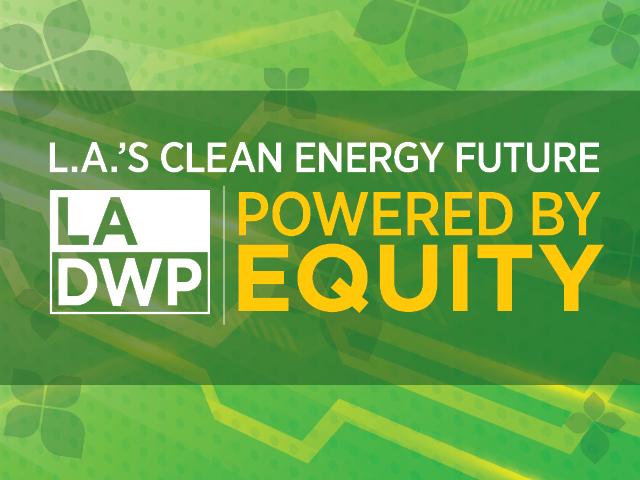
LADWP is committed to transitioning to a clean energy future in an equitable manner so that all customers can benefit from carbon-free technologies, programs and policies, and no one is left behind.
Following the release of the groundbreaking Los Angeles 100% Renewable Energy Study (LA100), LADWP launched LA100 Equity Strategies to ensure the path to 100% carbon-free energy is equitable as well as achievable.
LA100 Equity Strategies, a two-year study in partnership with the National Renewable Energy Laboratory (NREL) and UCLA, brings together L.A.-based community justice organizations and stakeholders in a Steering Committee to guide this unprecedented effort.
Together with our research partners and Committee members, we conducted extensive community engagement, through Listening Sessions with representatives from underserved communities across L.A., as well as broader outreach through Community Meetings with communities across L.A.
The result, the LA100 Equity Strategies Report, provides a detailed analysis of L.A.’s clean energy investment inequities and identifies strategies in the form of policies and programs for the City of Los Angeles to address them.
LA100 Equity Strategies Full Report
In the News
- Los Angeles Times
- New York Times
- Press Release: LADWP to Build and Operate EV Fast-Charging Stations in L.A.’s Underserved Communities, Offer $4,000 Used EV Rebate to Provide Working Class Angelenos a Clean Energy Future ‘Powered by Equity’
- Feature Story: Community-Driven Effort to Ensure Equitable Transition to 100% Clean Energy for L.A.
Next Steps: Powered by Equity

To rectify past inequities and ensure a just and equitable clean energy transition for Los Angeles, LADWP is launching Powered by Equity, a collection of initiatives designed to expand clean energy measure throughout Los Angeles to ensure that all Angelenos have access to reliable, resilient and affordable energy.
Our LA100 Equity Strategies Partners
Steering Committee
Comprised of L.A. environmental justice organizations representing a range of interests and equity deserving communities, the Steering Committee plays a central role in the study by providing strategic and technical direction to LA100 Equity Strategies through the identification of prioritized energy equity outcomes.
Meetings & Presentations
Kick-Off Meeting (11.05.21)
Meeting #2 (12.15.21)
Meeting #3 (01.26.22)
Meeting #4 (02.23.22)
Meeting #5 (03.23.22)
Meeting #6 (04.20.22)
Meeting #7 (05.18.22)
Meeting #8 (06.15.22)
Meeting #9 (07.20.22)
Meeting #10 (08.17.22)
Meeting #11 (09.21.22)
Meeting #12 (10.19.22)
Meeting #13 (11.16.22)
Meeting #14 (01.18.23)
Meeting #15 (02.15.23)
Meeting #16 (03.15.23)
Meeting #17 (03.29.23)
Meeting #18 (04.19.23)
Advisory Committee
Comprised primarily of representatives for the offices of elected officials and key city department partners and stakeholders, the Advisory Committee provides input, ideas, comments, perspectives, and feedback on the feasibility of strategies and approaches identified by the Steering Committee. The Advisory Committee identifies Equity Strategy priorities that intersect with other City departments’ programs and/or have potential for multi-benefit programs and partnerships with other City departments.
Meetings & Presentations
Meeting #1 (12.09.21)
Meeting #2 (2.16.22)
Meeting #3 (4.27.22)
Meeting #4 (6.22.22)
Meeting #5 (08.24.22)
Meeting #6 (10.26.22)
Meeting #7 (2.22.23)
Meeting #8 (4.26.23)
Research Partners
NREL: The National Renewable Energy Laboratory (NREL) is one of the U.S. Department of Energy’s 17 national labs tasked with tackling the critical scientific challenges of our time. NREL led the LA100 study and has been tapped to apply their superior modeling capabilities to identifying workable energy equity strategies for L.A.’s disadvantaged communities.
UCLA is our local research partner and will bring extensive community-based research capabilities, policy expertise and knowledge of equity-deserving communities to the study. LADWP is partnering with several UCLA research entities working in the areas of affordability, urban and socio-economics, equity, and jobs and workforce development.